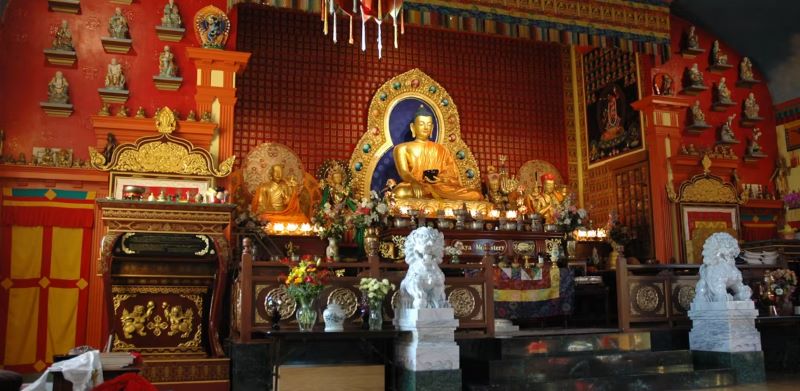
Introduction
Within a lot of spiritual circles, we hear terms like “inner peace” and “Oneness” thrown around a lot.
In search of these fantastical ideas that promise relief from suffering, we hop around from one retreat, workshop, teacher, or book to another … and another, and another.
Eventually, many spiritual seekers end up with a kind of “spiritual hangover” or inexplicable type of exhaustion that doesn’t seem to go away no matter how much yoga, trauma healing, plant medicine, and other alternative therapies we do.
In fact, it gradually dawns on us that peeling back the onion of the self seems to be a never-ending process. It seems to be that the more we try to self-heal, the more we find to heal.
It’s onions all the way down.
And in a sense, we’re being given the poison and sold the cure.
So with this kind of disillusionment, with this kind of never-ending self-perpetuating quest for more-more-more, where do we go next? What do we do? How do we slow down? How do we stop?
Firstly, I want to state clearly that I don’t have all the answers – and you don’t actually have to go anywhere or do anything. In fact, you don’t have to listen to anything I say or anything anyone says – your own deepest intuition of the truth is what matters most because it is what you’ll live by.
With that said, if you’re wanting to simplify but strengthen your spiritual practice in a way that feels direct, meaningful, and cuts through all the bullshit, you might like to look into the practice of self-inquiry.
What is Self-Inquiry?

Quite simply, self-inquiry is the practice and path of examining the nature of the self by asking the question “Who am I?” By repeatedly asking this question, identification with the false self (or ego) begins to dissolve, and one can experience spiritual enlightenment.
Self-inquiry was developed and taught by 20th-century sage and holy man Sri Ramana Maharshi, who himself said of self-inquiry:
Self-inquiry is the one, infallible means, the only direct one, to realize the unconditioned, absolute Being that you are.
Why Self-Inquiry is So Powerful

Technically, self-inquiry isn’t a meditation, it’s a way of life and one that is best incorporated into as many moments as possible.
But we all know how difficult it can be to commit our energy to something, particularly in the beginning and especially if our life context doesn’t permit that (e.g., working multiple jobs, struggling to find stable housing, taking care of children, etc.). So a meditation practice is often necessary.
One thing I love about self-inquiry is that it is refreshingly simple – as simple as asking “Who am I?” repeatedly – and yet it is also nuanced and multifaceted.
In fact, I’d say that self-inquiry meditation is perhaps one of the most advanced forms of spiritual practice out there. Why, you may wonder? The answer is that self-inquiry is like an arrow that goes straight into the heart of the ego or “I-thought.”
By slowly dismantling the false sense of ego self (if this confuses you, read more about the ego in my What is the Ego? guide), we come home to our True Nature or who we really are, which is unchanging, eternal, and free from suffering.
We recognize that we aren’t this separate self carrying around a happy, sad, neurotic, or elevated story – we are the luminous field of Peace that is prior to any thought, feeling, memory, or object. We are the sky, and everything else is just the clouds.
We come to see that our ego self is not only the source of all our suffering, but happily, it is also ultimately an illusion, a misunderstanding, a dream within Consciousness. And furthermore, our True Nature isn’t bound by any story, thing, object, memory, or experience – it is, in fact, limitless. We are Life itself.
How to Practice Self-Inquiry Meditation

So how do you practice self-inquiry meditation?
As I stated above, the method is simple:
Simply turn your attention inward, and ask the question, “Who am I?” repeatedly every so often.
Whenever any thought, emotion, memory, or sensation arises, you can also ask, “To whom is this thought/emotion/memory/sensation occurring?”
The key here is to recognize that all thoughts and images that your mind creates are just passing phenomena: they don’t truly define you as they come and go.
For example, in response to the question “Who am I?” you might think something like “My name is ___, I am a female, male, parent, sister, brother, mother, father, student, professional, I love rock music or classical, I’m sensitive, athletic …” or whatever your personal story happens to be.
Once these types of thoughts arise, Ramana Maharshi advises the following:
When other thoughts arise, one should not pursue them, but should inquire: ‘To whom do they arise?’ It does not matter how many thoughts arise. As each thought arises, one should inquire with diligence, “To whom has this thought arisen?”. The answer that would emerge would be “To me”. Thereupon if one inquires “Who am I?”, the mind will go back to its source; and the thought that arose will become quiescent. With repeated practice in this manner, the mind will develop the skill to stay in its source.
As you can see, there’s a kind of cyclical process here. We ask, “Who am I?” our mind responds, we then ask, “To whom has this thought arisen?” our mind responds with something to the effect of “to me,” and then we return again to the question “Who am I?”
12 Self-Inquiry Quotes to Meditate On

Our exploration of self-inquiry is incomplete without sharing further perspectives on this profound practice and the fruits or blessings that can be reaped as a result.
Here are twelve self-inquiry quotes to reflect or meditate on from a variety of awakened teachers:
The method of Self-inquiry is to turn the outward going mind back to its source, the Heart, the Self, and fix it ever there, preventing the rising of the empty “I.”
– Sri Ramana Maharshi
One who has wisely chosen the straight path of Self-inquiry can never go astray; for like the bright, clear Sun, the Self reveals itself direct to whoso turns towards it.
– Sri Ramana Maharshi
By saying, “This is the direct path for all”, Sri Bhagavan [Ramana Marshi] points out that anyone, however weak his mind may be, can acquire through this path that true strength of mind which is required to abide in the source.”
– Sri Sadhu Om (parenthesis my own)
One should realize one’s essential nature as pure consciousness. Thus does one attain liberation.
– The Yoga Vasistha
I am free, I am bodiless, I am without sex and indestructible. I am at peace; I am infinite, without blemish and eternal.
– Sri Sankara
That which dwells within all that is, that through which awareness itself become aware, that which exists in each thing as its individual nature, is the true ‘I’ that shines as pure consciousness.
– Sri Muruganar
Do not meditate – be!
Do not think that you are – be!
Don’t think about being – you are!– Sri Ramana Maharshi
Awareness is unattached and unshaken. It is lucid, silent, peaceful, alert and unafraid, without desire and fear. Meditate on it as your true being.–
Sri Nisargadatta Maharaj
The mind must learn that beyond the moving mind there is the background of awareness, which does not change. The mind must come to know the true Self and respect it and cease covering it up.
– Sri Nisargadatta Maharaj
Self-inquiry is a spiritually induced form of wintertime. It’s not about looking for a right answer so much as stripping away and letting you see what is not necessary, what you can do without, what you are without your leaves.
– Adyashanti
Mind is not improved by long journeys to far-flung places. Instead, make an internal pilgrimage. Take the mind back to its source and plunge it into the peace-giving waters of the Self. If you once make this pilgrimage, you will never need to go looking for happiness or peace in any other place.
– Sri Annamalai Swami
Self-inquiry is the process and the goal also. ‘I am’ is the goal and the final reality. To hold to it with effort is self-inquiry. When spontaneous and natural it is realisation.
– Sri Ramana Maharshi
Final Words

Self-inquiry is perhaps one of the most direct paths to spiritual Self-Realization available. I hope this simple guide has been of service to you. And if you want to access the essence of Ramana Maharshi’s teachings, you can find the digital booklet here for free thanks to the nonprofit organization Sri Ramanasramam.
You can also purchase the booklet here from Amazon if you want a hard copy.
Tell me, have you had any experience with the self-inquiry meditation practice or path? I’d love to hear any reflections or realizations you’ve had!

Aletheia Luna:
Aletheia Luna is a prolific psychospiritual writer, educator, and intuitive guide whose work has touched the lives of millions worldwide. As a survivor of fundamentalist religious abuse, her mission is to help others find love, strength, and inner light in even the darkest places. She is the author of hundreds of popular articles, as well as numerous books and journals on the topics of Self-Love, Spiritual Awakening, and more. See more of her work at lonerwolf.com.

Mateo Sol:
Mateo is a spiritual educator, guide, entrepreneur, and co-founder of one of the most influential and widely read spiritual websites on the internet. Born into a family with a history of drug addiction and mental illness, he was taught about the plight of the human condition from a young age. His mission is to help others experience freedom, wholeness, and peace in all stages of life. See more of his work at lonerwolf.com and his premium offerings here.
Originally published by LonerWolf, 02.17.2023, republished with permission.






